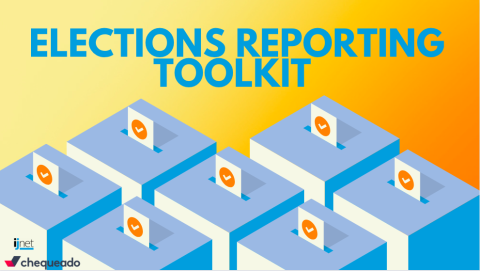
An extensive multimedia resource package to support journalists and newsrooms covering elections is now available in English, Farsi, Portuguese and Spanish.
The International Journalists’ Network (IJNet), in collaboration with Chequeado and Factchequeado, and supported by WhatsApp, has published its Elections Reporting Toolkit. It features articles and videos filled with the latest tips to counter disinformation around elections, safeguard digital security, and report on anti-democratic extremism, among other top-of-mind, election-related issues today.
The toolkit draws on critical lessons learned from past elections, in the U.S. in particular, as well as countries across Latin America.
“Our Elections Reporting Toolkit comes amid heightened polarization, unrest and disinformation around elections globally in recent years,” said David Maas, the director for IJNet, an ICFJ platform. “Our resources were designed to help journalists today better cover these critical stories, engage their audiences more deeply in them, and to stay safe.”
Disinformation around elections, and how to combat it, is a central focus. The resources address the nature of this false information – from efforts to confuse people to prevent them from voting to misleading content around ineligible voters. They also offer best practices to cover allegations of election fraud, counteract political disinformation on social media, and more.
A powerful and growing voting bloc, Latino communities in the U.S. have been targets of uniquely alarming disinformation campaigns in recent elections.
The U.S. is bracing for its 2024 presidential election – its first since the deadly Jan. 6, 2021 attack on the Capitol. Countries in the Spanish-speaking world, too, have elections of their own fast approaching, in Argentina, Ecuador and a pivotal presidential run-off in Guatemala later this week.
Augmenting the disinformation focus, earlier this summer IJNet also published a toolkit in four languages under ICFJ’s Disarming Disinformation program, supported by the Scripps Howard Fund, to help journalists counter the spread of false information.
The resources draw on information shared by experts during the program’s master classes on investigating disinformation, held in partnership with the Knight Center for Journalism in the Americas, and its Empowering the Truth Global Summit sessions, to equip journalists with cutting-edge tips and tools to amplify the reach of their fact-checking work.
Visit the toolkit in Arabic, English, French and Spanish for more.